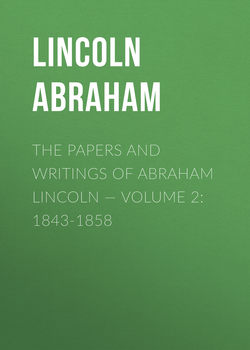Читать книгу The Papers And Writings Of Abraham Lincoln — Volume 2: 1843-1858 - Lincoln Abraham - Страница 9
1846 VERSES WRITTEN BY LINCOLN AFTER A VISIT TO HIS OLD HOME IN INDIANA
Оглавление(A FRAGMENT)
[In December, 1847, when Lincoln was stumping for Clay, he crossed into Indiana and revisited his old home. He writes: "That part of the country is within itself as unpoetical as any spot on earth; but still seeing it and its objects and inhabitants aroused feelings in me which were certainly poetry; though whether my expression of these feelings is poetry, is quite another question."]
Near twenty years have passed away
Since here I bid farewell
To woods and fields, and scenes of play,
And playmates loved so well.
Where many were, but few remain
Of old familiar things;
But seeing them to mind again
The lost and absent brings.
The friends I left that parting day,
How changed, as time has sped!
Young childhood grown, strong manhood gray,
And half of all are dead.
I hear the loved survivors tell
How naught from death could save,
Till every sound appears a knell,
And every spot a grave.
I range the fields with pensive tread,
And pace the hollow rooms,
And feel (companion of the dead)
I 'm living in the tombs.
VERSES WRITTEN BY LINCOLN CONCERNING A SCHOOL-FELLOW
WHO BECAME INSANE — (A FRAGMENT)
And when at length the drear and long
Time soothed thy fiercer woes,
How plaintively thy mournful song
Upon the still night rose
I've heard it oft as if I dreamed,
Far distant, sweet and lone;
The funeral dirge it ever seemed
Of reason dead and gone.
Air held her breath; trees with the spell
Seemed sorrowing angels round,
Whose swelling tears in dewdrops fell
Upon the listening ground.
But this is past, and naught remains
That raised thee o'er the brute;
Thy piercing shrieks and soothing strains
Are like, forever mute.
Now fare thee well! More thou the cause
Than subject now of woe.
All mental pangs by time's kind laws
Hast lost the power to know.
O Death! thou awe-inspiring prince
That keepst the world in fear,
Why dost thou tear more blest ones hence,
And leave him lingering here?
